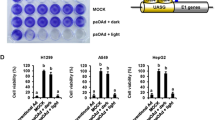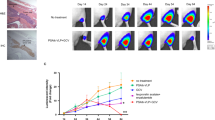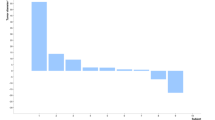Abstract
Conditionally replicating adenoviruses that selectively replicate in tumor cells, but not in normal cells, are being explored as virotherapeutic agents for cancer. A prostate-specific oncolytic adenovirus, CG7870 is currently being evaluated in phase 1/2 clinical trials for the treatment of prostate cancer. To decrease the effective dose and further increase the therapeutic efficacy of CG7870, the combination of virotherapy with radiation therapy was explored in this study. CG7870 is an oncolytic adenovirus in which tumor-specific promoters are driving the expression of E1A and E1B proteins. The effects of combined treatment with CG7870 and radiation on cultured cells were determined in cytotoxicity and virus yield assays. The antitumor efficacy of CG7870 (1 × 107 particles/mm3 of tumor), 10 Gy of local radiation or both was evaluated in established subcutaneous LNCaP xenografts in nude mice. In vitro, the dual agent treatment resulted in synergistically enhanced potency at suboptimal doses of radiation and virus. Virus yield in irradiated cells increased relative to yield in nonirradiated cells without compromising the specificity of the vector for its target cell types. In vivo, CG7870 treatment alone suppressed tumor growth and extended tumor nonprogression time. The average tumor-volume of the groups treated with CG7870 only and radiation only was 121 and 126% of baseline, respectively, 39 days after treatment. The average tumor-volume of the combination group was 34% of baseline 39 days after a single dose of treatment. No significant body weight loss was observed in any treatment group. There was a significant drop in serum level of prostate-specific antigen (PSA) in the combination group compared to the group treated with either agent alone. In mice treated with CG7870 only or radiation only, serum PSA levels changed to 26 and 383% of baseline, respectively, by study day 46. In contrast, PSA levels in mice treated with CG7870 plus radiation decreased to less than 11% of baseline by study day 46. Histological analysis of tumor sections collected from the combination group revealed enhanced necrosis and more apoptotic cells. Combination of CG7870 with radiotherapy significantly increased antitumor efficacy compared to either agent alone. These results suggest that CG7870 in combination with radiation has improved antitumor efficacy at lower doses and with no additional side effects.
This is a preview of subscription content, access via your institution
Access options
Subscribe to this journal
Receive 12 print issues and online access
$259.00 per year
only $21.58 per issue
Buy this article
- Purchase on Springer Link
- Instant access to full article PDF
Prices may be subject to local taxes which are calculated during checkout






Similar content being viewed by others
References
Post DE, Khuri FR, Simons JW, et al. Replicative oncolytic adenoviruses in multimodal cancer regimens. Hum Gene Ther. 2003;14:933–946.
Kirn D . Clinical research results with dl1520 (Onyx-015), a replication-selective adenovirus for the treatment of cancer: what have we learned? Gene Therapy. 2001;8:89–98.
Heise C, Lemmon M, Kirn D . Efficacy with a replication-selective adenovirus plus cisplatin-based chemotherapy: dependence on sequencing but not p53 functional status or route of administration. Clin Cancer Res. 2000;6:4908–4914.
Yu DC, Chen Y, Dilley J, et al. Antitumor synergy of CV787, a prostate cancer-specific adenovirus, and paclitaxel and docetaxel. Cancer Res. 2001;61:517–525.
DeWeese TL, van der Poel H, Li S, et al. A phase I trial of CV706, a replication-competent, PSA selective oncolytic adenovirus, for the treatment of locally recurrent prostate cancer following radiation therapy. Cancer Res. 2001;61:7464–7472.
Chen Y, Deweese T, Dilley J, Zhang Y, et al. CV706, a prostate cancer-specific adenovirus variant, in combination with radiotherapy produces synergistic antitumor efficacy without increasing toxicity. Cancer Res. 2001;61:5453–5460.
Yu DC, Chen Y, Seng M, et al. The addition of the Ad5 Region E3 enables Calydon virus 787 to eliminate distant prostate tumor xenografts. Cancer Res. 1999;59:4200–4203.
Mittereder N, March KL, Trapnell BC . Evaluation of the concentration and bioactivity of adenovirus vectors for gene therapy. J Virol. 1996;70:7498–7509.
Milas L, Mason K, Hunter N, et al. In vivo enhancement of tumor radioresponse by C225 antiepidermal growth factor receptor antibody. Clin Cancer Res. 2000;6:701–708.
Giatromanolaki A, Sivridis E, Koukourakis MI, et al. Intratumoral angiogenesis: a new prognostic indicator for stage I endometrial adenocarcinomas? Oncol Res. 1999;11:205–212.
Milross CG, Tucker SL, Mason KA, et al. The effect of tumor size on necrosis and polarographically measured pO2. Acta Oncol. 1997;36:183–189.
Zhang M, Li S, Li J, et al. Ionizing radiation increases adenovirus uptake and improves transgene expression in intrahepatic colon cancer xenografts. Mol Ther. 2003;8:21–28.
Wang Z, Cook T, Alber S, et al. Adenoviral gene transfer of the human inducible nitric oxide synthase gene enhances the radiation response of human colorectal cancer associated with alterations in tumor vascularity. Cancer Res. 2004;64:1386–1395.
Advani SJ, Sibley GS, Song PY, et al. Enhancement of replication of genetically engineered herpes simplex viruses by ionizing radiation: a new paradigm for destruction of therapeutically intractable tumors. Gene Therapy. 1998;5:160–165.
Spear MA, Sun F, Eling DJ, et al. Cytotoxicity, apoptosis, and viral replication in tumor cells treated with oncolytic ribonucleotide reductase-defective herpes simplex type 1 virus (hrR3) combined with ionizing radiation. Cancer Gene Ther. 2000;7:1051–1059.
Senzer N, Mani S, Rosemurgy A, et al. TNFerade biologic, an adenovector with a radiation-inducible promoter, carrying the human tumor necrosis factor alpha gene: a phase I study in patients with solid tumors. J Clin Oncol. 2004;22:592–601.
Yu DC, Sakamoto GT, Henderson DR . Identification of the transcriptional regulatory sequences of human kallikrein 2 and their use in the construction of Calydon virus 764, an attenuated replication competent adenovirus for prostate cancer therapy. Cancer Res. 1999;59:1498–1504.
Wodarz D . Gene therapy for killing p53-negative cancer cells: use of replicating versus nonreplicating agents. Hum Gene Ther. 2003;14:153–159.
Freytag SO, Stricker H, Pegg J, et al. Phase I study of replication-competent adenovirus-mediated double-suicide gene therapy in combination with conventional-dose three-dimensional conformal radiation therapy for the treatment of newly diagnosed, intermediate- to high-risk prostate cancer. Cancer Res. 2003;63:7497–7506.
Toth K, Tarakanova V, Doronin K, et al. Radiation increases the activity of oncolytic adenovirus cancer gene therapy vectors that over express the ADP (E3-11.6 K) protein. Cancer Gene Ther. 2003;10:193–200.
Acknowledgements
We thank Gail Colbern, Melinda Vanroey and Yu Chen and the staff of the animal facility at Cell Genesys Inc., for excellent help in animal studies.
Author information
Authors and Affiliations
Corresponding author
Rights and permissions
About this article
Cite this article
Dilley, J., Reddy, S., Ko, D. et al. Oncolytic adenovirus CG7870 in combination with radiation demonstrates synergistic enhancements of antitumor efficacy without loss of specificity. Cancer Gene Ther 12, 715–722 (2005). https://doi.org/10.1038/sj.cgt.7700835
Received:
Published:
Issue Date:
DOI: https://doi.org/10.1038/sj.cgt.7700835
Keywords
This article is cited by
-
A phase 1 trial of the safety, tolerability and biological effects of intravenous Enadenotucirev, a novel oncolytic virus, in combination with chemoradiotherapy in locally advanced rectal cancer (CEDAR)
Radiation Oncology (2020)
-
Recombinant viruses with other anti-cancer therapeutics: a step towards advancement of oncolytic virotherapy
Cancer Gene Therapy (2018)
-
Radiosensitization in prostate cancer: mechanisms and targets
BMC Urology (2013)
-
EGFR-Targeted Adenovirus Dendrimer Coating for Improved Systemic Delivery of the Theranostic NIS Gene
Molecular Therapy - Nucleic Acids (2013)
-
Increased oncolytic efficacy for high-grade gliomas by optimal integration of ionizing radiation into the replicative cycle of HSV-1
Gene Therapy (2011)



